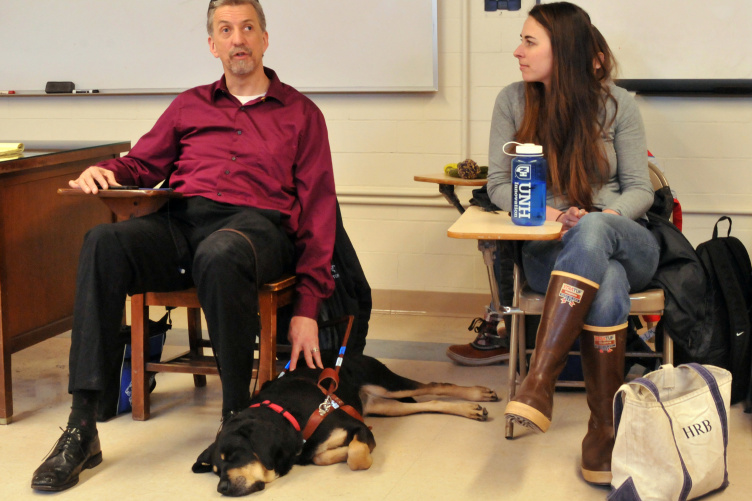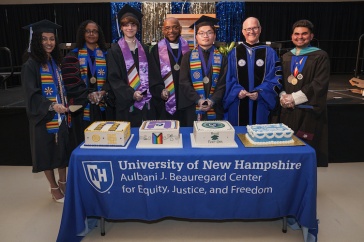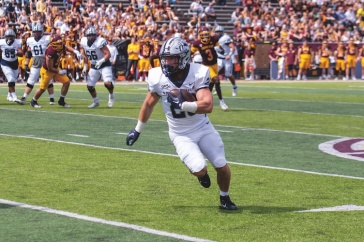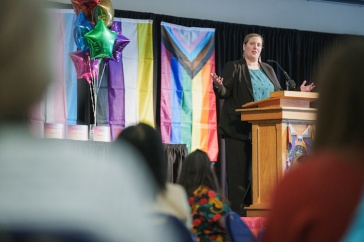
UNH alumnus Randy Pierce (left) and guidedog Autumn and UNH alumna Alyssa Ballestero ’10 visited professor Brent Bell’s “Risk and the Human Experience” class recently.
For Randy Pierce ’88, the stairs at the MUB can pose a risk. But so does running the Boston Marathon, which he's already done; hiking in the White Mountains, which he enjoys frequently; and reaching the summit of Mount Kilimanjaro, which he plans to do next year.
So the MUB stairs shouldn't have been too tough when he made a visit to his beloved Durham campus. It was one of the first times he'd been back since losing his vision at the age of 22. Touring with friend and professor Brent Bell, he didn't even think of the MUB as a possible pitfall. He had spent countless hours there as a student, hanging out and even working as a MUB manager.
As they approached a set of stairs in the renovated MUB, he thought he knew his way around — but his guidedog knew better.
As Pierce told a group of students in Brent Bell's "Risk and the Human Experience" class recently, he misjudged, tripped, and before he knew it, he and his guidedog were tumbling down a flight of stairs.
Pierce shared the story to show not only how much he relies on his guidedog, but also how risks can come from the most ordinary and routine places.
Pierce was joined in Bell's class by Alyssa Ballestero '10, who took a risk of a different kind in the last year — she got naked.
Ballestero will appear on the Discovery Channel's "Naked and Afraid," a reality show where contestants must survive exposure to extreme environments without food, water, clothing or shelter for 21 days.
Pierce and Ballestero shared with students how they've each approached risk in different ways, and answered questions about their experiences.
"I am not a naked person," Ballestero told the students, laughing along with them at how strange it is to make that declaration. But she was trying to make the point that going on such a show was a huge risk for her. It wasn't something that she planned, either.
"I never really think of it as making a solid decision to go on "Naked and Afraid"; it was one of those 'happened to' situations," Ballestero says. "I happened to hear about the show; I happened to apply; I happened to get flown out to L.A. for finals — all of which led to, I happened to get accepted to do an episode! Every next step of the process was just a once in a lifetime opportunity that is just so rare that you don't say no to the opportunity."
Bell, who has taught the class since 2005, says both former student Ballestero and longtime friend Pierce brought different perspectives to the idea of risk-taking.
He said that as a student, Alyssa was shy, quiet and often questioned herself, but that since facing up to her shyness, "is leading this wonderful, full life as someone stepping into challenges and figuring them out.
"Randy is leading a similarly full life; they both face risks and embody a spirit of solving problems, accepting failure and being tenacious in pursuit of their goals," Bell says. "They are great role models for facing challenges and figuring them out."
Students asked a variety of questions, and were curious about Peirce's everyday life — how does he pick out matching outfits, for example. He noted his wife is a big help, and that he had tricks like putting a safety pin in the right-side collar of a red shirt ("right for red") to help him know what he's putting on. They also wondered how he knew what time it was, and how he's learned to work with a guidedog — a question which prompted the MUB tumble story.
Pierce describes himself as a "risk assessor and a risk manipulator." One of the reasons he likes winter hiking, for example, is that a deep snow makes footing actually easier when walking through wooded areas because it covers the roots and rocks that make for tricky terrain. And that, he explains, is how he manages doing these amazing trips that some might find too challenging for someone who has lost his vision.
"The way I see it, you can either find someone who already solved a problem and find out how they did it, or you can be a pioneer and find a new solution," he says.
When he's not tackling outdoor adventures with his current guide dog, Autumn (who slept quietly by his side during his visit to Bell's class), Pierce is a sought-after speaker who focuses on the idea of social risk management.
Bell's class is a discovery course, meant to allow first-year students to engage in critical thinking — something that Bell agrees is important for students embarking on their college careers.
"If you accept the idea that we control the direction of our lives, and our decisions make a difference, then assessing risk is part of our daily life," says Bell, who likes the definition of risk that his friend Preston Cline, a leading risk management consultant, uses : that risk carries with it just as much gain as it does loss.
The class is made up of classroom instruction, but also some non-traditional homework assignments, encouraging students to take risks. So they are tasked with visiting class members in their rooms, visiting their professors during office hours, presenting at the Undergraduate Research Conference and other things outside their collective comfort zone. Bell recently took the self-identified "country mice" students on an overnight trip in Boston, and the "city mice" to camp out at UNH's Browne Center overnight.
"My goal is for students to become better thinkers. I want them to understand and recognize what influences their decisions and hopefully provide skills to make good decisions," says Bell. "In essence, it is a class on good judgment."
What the Risk Takers Say
Randy Pierce on being a 'risk manipulator: If an activity has a risk association, that is an opportunity to explore ways to reduce risk. For example, in July 2010 a fully sighted hiker fell to his death when choosing to step towards the edge of a water run-off with a 30-foot drop. His goal was to capture a picture. The reward of the picture was worth some risk but undoubtedly he didn’t evaluate the full risk or he might have taken a slightly different approach. Using a rope to tie off before approaching the edge is just one simple example of how that might have reduced his risk significantly. We don’t operate in a zero-risk world, and the balance is evaluating risk vs. reward and regardless of the reward what can we do to minimize risk. Riding in a car is the most risk-intensive activity most of us undertake on a daily basis. There are simple and common risk managements here, is the driver speeding, experienced, texting? Or is there other distractive behavior? The first step is to evaluate the risk and the second is to consider how we might manipulate the risk to still achieve the desired result but in a safer manner.
What he means by social risk management: [Raising a hand in class or introducing yourself to someone new] are excellent examples of social risk management. Most people understand that actions may result in seemingly punitive responses in the social arena, but I don’t believe they are viewing it fully as the reward and risk relationship. I find social risk management to be a very powerful inhibitor to communication and the better enjoyment of being ourselves. We learn behaviors very easily and that means with a little explorative encouragement we can understand how truly beneficial those social risks can be for us and, similarly, how ultimately negligible most of the risks involved become with just a little management/manipulation of the situation.
Alyssa Ballestero on what she would tell her UNH freshman self: Don't worry, you will love living at Williamson dorm, the reason there are so many choices at the MUB is not so you will eat everything for lunch, always dress warmer than you think in winter months, laying on the lawn on a 50 degree spring day will feel like summer and reserving a room at the library for group projects is not only necessary but fun. Most importantly, in order to get the most of your education in Outdoor Ed you need to go through experiences that are uncomfortable.
What she's learned from the risks she's taken: I find myself looking back on the lessons that were taught and I understand them a lot more after near-death experiences on my NOLS trip down the Amazon river, or leading a group of high schoolers through the backcountry in Alaska, or first-hand experience evacuating a student from an expedition. The biggest benefit I have experienced after all of these big risks has been self awareness. I have gained a confidence in myself that 10 years ago I did not have. I am glad that I was who I was, because I am able to understand first-hand the challenges that some of the people I work with have. I can have sympathy to those who are challenged by risk or self confidence. I am also able to push myself just that little bit more when taking on a big risk, which is important to know when you are pushing yourself in an unhealthy way or in an educational way. Another benefit is that I have these experiences I can look back on. I think about them all the time, when I am hiking a mountain or running a race; I think back on how I pushed myself on day three and I was dehydrated like I have never experienced. I am able to push myself on that run or hike knowing I have been through a lot worse. It can also work the other way, I will be sleeping in on a Sunday and I am able to lie there without guilt, enjoying the weight of the covers, looking back on a time I slept naked in the sand with a bad sunburn and mosquitos buzzing around and eating my flesh. Going through those challenges definitely makes you appreciate the little things you have!
Learn More
Check out Randy Pierce's web page, which chronicles his adventures and his 2020 VisionQuest organization.
Watch a 2010 video of Randy, explaining how he began his journey to hike the 48s.
Be sure to catch the "Naked and Afraid" premiere on Sunday, April 19, on the Discovery Channel.
UNH Outdoor Education program
-
Written By:
Michelle Morrissey ’97 | UNH Magazine | michelle.morrissey@unh.edu
















































